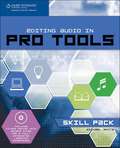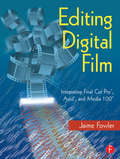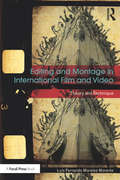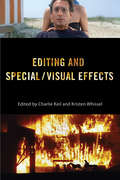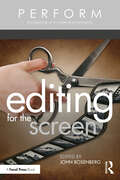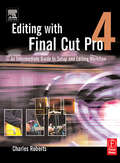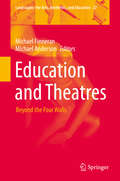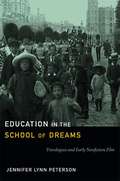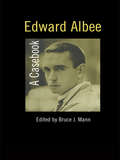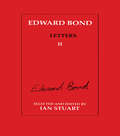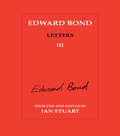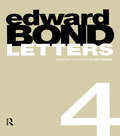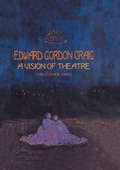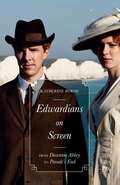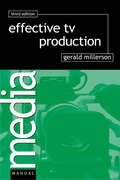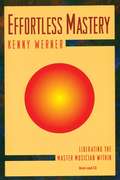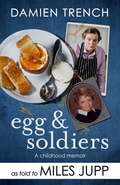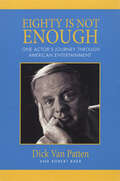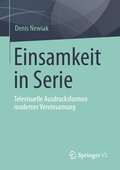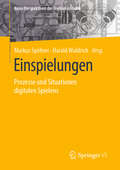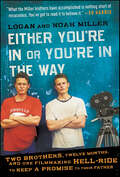- Table View
- List View
Editing Audio in Pro Tools: Skill Pack
by Michael WhiteEditing audio is one of the most important and often one of the least understood and most confusing functions of any DAW. However, it is also a function to which Pro Tools is particularly well suited. Editing Audio in Pro Tools: Skill Pack is your key to demystifying and mastering all of the audio editing tools available in Pro Tools. This unique book/CD-ROM learning tool provides an interactive and hands-on method for learning the art of editing audio in Pro Tools. Unlike other books with companion discs, the source files on your Skill Pack CD-ROM are an essential part of the book's tutorials-they are not there as mere examples; they are the building blocks from which you'll construct the projects. The result is a fully integrated learning experience. You'll learn by applying the skills you've been taught through real-life experience. By the end of the book, you'll have a fundamental understanding of the design and philosophy of editing audio in Pro Tools, you'll be able to work faster, and you'll know how to avoid common pitfalls and mistakes. Editing Audio in Pro Tools: Skill Pack truly has something for users of every skill level. Whether you are already a seasoned engineer looking to refine your editing skills, are switching to Pro Tools from another recording application, or are a songwriter or musician looking to make sense of this professional-level DAW, Editing Audio in Pro Tools: Skill Pack is sure to help you improve your projects. Beginners can progress from the start of the book to the end to get a comprehensive look at the entire Pro Tools editing system, and more advanced users can skip directly to a chapter that focuses on a particular editing feature they want to study-the source files on the CD are set up so that you don't necessarily need to start from the beginning. So what are you waiting for? Better audio editing skills will never be easier to attain!
Editing Digital Film: Integrating Final Cut Pro, Avid, and Media 100
by Jaime FowlerAt long last, film and video editors are using the same systems to edit their projects, and Editing Digital Film is the guide to show them how to do it. This concise reference provides video and film editors familiar with the Avid, Media 100, and Final Cut Pro systems with crucial information they will need to edit on all three of these systems. In addition to showing film editors and directors working on DV projects how to edit for this new format, this text also clarifies the NLE process to those familiar with traditional film editing.With its focus on the essentials of integrating nonlinear editing with film, Editing Digital Film is an excellent resource for video editors wishing to edit films, and for film editors wishing to learn how films are integrated into nonlinear systems. With coverage the film cutting process, post production methods, telecine, matchback editing, HDTV, 24P, cutting DV, and all necessary tools to get the job done, this is the perfect guide for those interested in editing digital film.
Editing and Montage in International Film and Video: Theory and Technique
by Luís Fernando Morales MoranteEditing and Montage in International Film and Video presents a theoretical and practical approach to the art of editing. In this book, Luís Fernando Morales Morante explores the international history, technology, theory, practical techniques, psychology, and cognitive effects of editing across a range of media from around the world, featuring case studies from film, dramatic television, news media, music videos, commercials, and mobile-delivered formats, from the films of Sergei Eisenstein to Michael Jackson’s "Thriller" to coverage of the 2012 U.S. presidential elections. The book includes self-study exercises throughout to help readers put theory into practice.
Editing and Special/Visual Effects
by Kristen Whissel Dana Polan Ariel Rogers Scott Higgins Julie Turnock Tanine Allison Paul Monticone Dan North Professor Deron Overpeck Benjamin Wright Meraj Dhir Lisa Purse Professor Charlie KeilMost moviegoers think of editing and special effects as distinct components of the filmmaking process. We might even conceive of them as polar opposites, since effective film editing is often subtle and almost invisible, whereas special effects frequently call attention to themselves. Yet, film editors and visual effects artists have worked hand-in-hand from the dawn of cinema to the present day. Editing and Special/Visual Effects brings together a diverse range of film scholars who trace how the arts of editing and effects have evolved in tandem. Collectively, the contributors demonstrate how these two crafts have been integral to cinematic history, starting with the "trick films" of the early silent era, which astounded audiences by splicing in or editing out key frames, all the way up to cutting-edge effects technologies and concealed edits used to create the illusions. Throughout, readers learn about a variety of filmmaking techniques, from classic Hollywood's rear projection and matte shots to the fast cuts and wall-to-wall CGI of the contemporary blockbuster. In addition to providing a rich historical overview, Editing and Special/Visual Effects supplies multiple perspectives on these twinned crafts, introducing readers to the analog and digital tools used in each craft, showing the impact of changes in the film industry, and giving the reader a new appreciation for the processes of artistic collaboration they involve.
Editing for the Screen (ISSN)
by John RosenbergCombining essays and interviews with editors from film and television, this collection explores the business side of film editing. Over 30 industry professionals dispel myths about the industry and provide practical advice on the business of film and TV editing.John Rosenberg has brought together contributions from Dody Dorn (Momento), Scott Conrad (Rocky), Kevin Tent (The Holdovers), Bruce Green (Cool Runnings), Nancy Forner (Buffy the Vampire Slayer), and Yu Jung Hou (American Born Chinese), among others, to provide diverse perspectives on editing a variety of formats from feature films to sitcoms, working with other departments, and breaking into the field as an assistant editor. Building on the craft of editing and looking at how aspiring editors can apply this to the industry, readers are taken through the process from getting started in the industry, to progressing through your career and getting ahead as an editor. Readers will also learn about entrepreneurial expectations in relation to marketing, strategies for contending with the emotional highs and lows of editing, and money management whilst pursuing a career in editing for film and television.Written for undergraduates and graduates studying film and TV editing, as well as aspiring editors, this book provides readers with a wealth of first-hand information that will help them create their own opportunities and pursue a career in film and television.
Editing with Final Cut Pro 4: An Intermediate Guide to Setup and Editing Workflow
by Charles RobertsWhether you've mastered the basics of Final Cut Pro and want to take your skills to the next level, or if you're a video editor new to Final Cut Pro and looking to put your own system together, this book is for you. Written by "chawla," a Final Cut Pro guru and veteran moderator on 2-Pop/Creative Cow, this book covers the interface basics and workflow but goes beyond to address intermediate techniques and timesaving tips for professional results. Roberts does not assume you have an IT staff on hand and therefore goes into crucial issues of set up, configuration, consumer advice on hardware purchasing, and troubleshooting. Equally valuable is coverage of working with formats such as standard definition, uncompressed, and FireWire DV.
Edna Ferber's Hollywood: American Fictions of Gender, Race, and History (Texas Film and Media Studies Series)
by J. E. SmythEdna Ferber’s Hollywood reveals one of the most influential artistic relationships of the twentieth century—the four-decade partnership between historical novelist Edna Ferber and the Hollywood studios. Ferber was one of America’s most controversial popular historians, a writer whose uniquely feminist, multiracial view of the national past deliberately clashed with traditional narratives of white masculine power. Hollywood paid premium sums to adapt her novels, creating some of the most memorable films of the studio era—among them Show Boat, Cimarron, and Giant. Her historical fiction resonated with Hollywood’s interest in prestigious historical filmmaking aimed principally, but not exclusively, at female audiences. In Edna Ferber’s Hollywood, J. E. Smyth explores the research, writing, marketing, reception, and production histories of Hollywood’s Ferber franchise. Smyth tracks Ferber’s working relationships with Samuel Goldwyn, Leland Hayward, George Stevens, and James Dean; her landmark contract negotiations with Warner Bros.; and the controversies surrounding Giant’s critique of Jim-Crow Texas. But Edna Ferber’s Hollywood is also the study of the historical vision of an American outsider—a woman, a Jew, a novelist with few literary pretensions, an unashamed middlebrow who challenged the prescribed boundaries among gender, race, history, and fiction. In a masterful film and literary history, Smyth explores how Ferber’s work helped shape Hollywood’s attitude toward the American past.
Edna Ferber's Hollywood: American Fictions of Gender, Race, and History (Texas Film and Media Studies Series)
by J. E. SmythEdna Ferber’s Hollywood reveals one of the most influential artistic relationships of the twentieth century—the four-decade partnership between historical novelist Edna Ferber and the Hollywood studios. Ferber was one of America’s most controversial popular historians, a writer whose uniquely feminist, multiracial view of the national past deliberately clashed with traditional narratives of white masculine power. Hollywood paid premium sums to adapt her novels, creating some of the most memorable films of the studio era—among them Show Boat, Cimarron, and Giant. Her historical fiction resonated with Hollywood’s interest in prestigious historical filmmaking aimed principally, but not exclusively, at female audiences. In Edna Ferber’s Hollywood, J. E. Smyth explores the research, writing, marketing, reception, and production histories of Hollywood’s Ferber franchise. Smyth tracks Ferber’s working relationships with Samuel Goldwyn, Leland Hayward, George Stevens, and James Dean; her landmark contract negotiations with Warner Bros.; and the controversies surrounding Giant’s critique of Jim-Crow Texas. But Edna Ferber’s Hollywood is also the study of the historical vision of an American outsider—a woman, a Jew, a novelist with few literary pretensions, an unashamed middlebrow who challenged the prescribed boundaries among gender, race, history, and fiction. In a masterful film and literary history, Smyth explores how Ferber’s work helped shape Hollywood’s attitude toward the American past.
Education and Theatres: Beyond the Four Walls (Landscapes: the Arts, Aesthetics, and Education #27)
by Michael Anderson Michael FinneranThis volume is the first book to map a broad range of practices and critically examine the impact of education and outreach programmes in theatres and theatre companies around the globe.This innovative volume looks specifically at the manner in which theatres and theatre companies engage in educational, outreach and community work. An array of global case studies examines a wide range of existing and innovative practices, and scrutinises how this work achieves successful results and delivers impact and outcome on investment.The editors set the scene briefly in terms of the history of education in theatre organisations, and then move on to chart some of the difficulties and challenges associated with this work, as well as looking into the conceptual issues that need to be interrogated so that we may understand the impact of outreach and education work on the communities and audiences it aims to reach. A range of theatre practitioners and academics describe their work, its background, and what the authors understand to be successful outcomes for both the participants and the theatres. Finally, the book offers suggestions for both practitioners and researchers regarding further development in this work.
Education in the School of Dreams: Travelogues and Early Nonfiction Film
by Peterson Jennifer LynnIn the earliest years of cinema, travelogues were a staple of variety film programs in commercial motion picture theaters. These short films, also known as "scenics," depicted tourist destinations and exotic landscapes otherwise inaccessible to most viewers. Scenics were so popular that they were briefly touted as the future of film. But despite their pervasiveness during the early twentieth century, travelogues have been overlooked by film historians and critics. In Education in the School of Dreams, Jennifer Lynn Peterson recovers this lost archive. Through innovative readings of travelogues and other nonfiction films exhibited in the United States between 1907 and 1915, she offers fresh insights into the aesthetic and commercial history of early cinema and provides a new perspective on the intersection of American culture, imperialism, and modernity in the nickelodeon era. Peterson describes the travelogue's characteristic form and style and demonstrates how imperialist ideologies were realized and reshaped through the moving image. She argues that although educational films were intended to legitimate filmgoing for middle-class audiences, travelogues were not simply vehicles for elite ideology. As a form of instructive entertainment, these technological moving landscapes were both formulaic and also wondrous and dreamlike. Considering issues of spectatorship and affect, Peterson argues that scenics produced and disrupted viewers' complacency about their own place in the world.
Edward Albee: A Casebook (Casebooks on Modern Dramatists #Vol. 29)
by Bruce MannFrom the "angry young man" who wrote Who's Afraid of Virginia Woolf in 1962, determined to expose the emptiness of American experience to Tiny Alice which reveals his indebtedness to Samuel Beckett and Eugene Ionesco's Theatre of the Absurd, Edward Albee's varied work makes it difficult to label him precisely. Bruce Mann and his contributors approach Albee as an innovator in theatrical form, filling a critical gap in theatrical scholarship.
Edward Bond: Letters 2
by Ian StuartFirst Published in 1996. Routledge is an imprint of Taylor & Francis, an informa company.
Edward Bond: Letters 3
by Ian StuartFirst Published in 1997. Routledge is an imprint of Taylor & Francis, an informa company.
Edward Bond: Letters 4 (Contemporary Theatre Studies #Vol. 14.)
by Ian StuartEdward Bond Letters, Volume IV, focuses on four significant areas of Edward Bond's work: education, imagination and the child; theatre-in-education; At the Inland Sea; language and imagery. The letters represent a coruscating attack on our present society, as well as offering insights into how the situation might be improved. Bond's letters attack modern education, arguing that "children are being educated to sell themselves" and suggesting that social problems are caused by an oppression of the imagination. Many letters refer directly to a play - for instance Tuesday, which presents an assessment of the many difficulties faced by contemporary society. The language and imagery of one of Bond's most recent plays, In the Company of Men, is animatedly discussed, and Bond reminds us in a final description that "the good image is always absent, because it is present in the mind.
Edward Gordon Craig: A Vision of Theatre
by Christopher InnesEdward Gordon Craig's ideas regarding set and lighting have had an enormous impact on the development of the theatre we know today. In this new and updated edition of his well-known study of Edward Gordon Craig, Professor Christopher Innes shows how Craig's stage work and theoretical writings were crucial to the development of modern theatre. This book contains extensive documentation and re-evaluates his significance as an artist, actor, director and writer. Craig is placed in historical context, and his productions are reconstituted from unpublished prompt-books, sketches, journals and correspondence. Most of the designs and photographs, and many of Craig's writings cited, are not available elsewhere in print. Readers will gain insight into a key period of theatrical history, the life of one of its most fascinating individuals, the nature of stage performance, and into revolutionary ideas that are still challenging today.
Edwardians on Screen: From Downton Abbey to Parade’s End
by Katherine ByrneThis book explores television's current fascination with the Edwardian era. By exploring popular period dramas such as Downton Abbey , it examines how the early twentieth century is represented on our screens, and what these shows tell us about class, gender and politics, both past and present.
Effective TV Production
by Gerald MillersonEffective TV Production gives a succinct but thorough overview of the production process. Whatever your role in television, this book outlines the main functions of your job, placing them in the context of all other operations and showing how they are interrelated. The book shows how, within the often severe limitations of time and money, it is possible to originate interesting and competitive television programmes. It describes the essentials of good camerawork and relates them to considerations of audio, staging, lighting, make-up and wardrobe techniques and the way in which a production is developed in approach and style form the initial stages to the moment of shooting. This edition is substantially revised to reflect developments in technology and contemporary production styles.Gerald Millerson'd books on television have long been acknowledged as among the best ever published.
Effortless Mastery - Liberating the Master Musician Within
by Kenny WernerWerner explores ways of opening the master within each of us. The print book includes a cd of guided meditations not available in this format.
Egg and Soldiers: A Childhood Memoir (with postcards from the present) by Damien Trench
by Miles Jupp'A gloriously enjoyable read from start to finish' - Daily Express'Here's a book to savour' - Mail on SundayMiles Jupp (News Quiz presenter, star of Rev, I'm Sorry I Haven't a Clue and The Thick Of It) delves into the mind of his comedy creation Damien Trench - urbane food writer and protagonist of BBC Radio 4's acclaimed sitcom In and Out of the Kitchen. 'Are you Damien Trench?' said the lady operating the stall.'I might be,' I said to the lady.'You are though, aren't you?' she asked.'Well...yes,' I agreed. And that was that.She seized me by both hands, pulled me towards her, and launched into a passionate monologue that covered a selection of dessert recipes that I had once offered up in print, her difficult relationship with soft cheeses and her husband's irritable skin. So intense was her manner that it was extremely difficult to tell if she was scolding or praising me. All I knew was that she was staring so intently at me that I became worried that parts of me would dry up and just drop off like smoked chipotles. Also, her eyes were so extremely wide open that I began to worry that it might be dangerous to let so much light into your head. As soon as she stopped speaking, I thanked her for being willing to share, broke free from her grasp, panic-bought three punnets of raspberries on the way out and then sprinted back to the Uno as fast as fast can be.'Whether you're already a fan of Jupp's bumbling bon viveur, or are stumbling across him for the first time, here's a book to savour.' Mail on Sunday
Egg and Soldiers: A Childhood Memoir (with postcards from the present) by Damien Trench
by Miles Jupp'A gloriously enjoyable read from start to finish' - Daily Express'Here's a book to savour' - Mail on SundayMiles Jupp (News Quiz presenter, star of Rev, I'm Sorry I Haven't a Clue and The Thick Of It) delves into the mind of his comedy creation Damien Trench - urbane food writer and protagonist of BBC Radio 4's acclaimed sitcom In and Out of the Kitchen. 'Are you Damien Trench?' said the lady operating the stall.'I might be,' I said to the lady.'You are though, aren't you?' she asked.'Well...yes,' I agreed. And that was that.She seized me by both hands, pulled me towards her, and launched into a passionate monologue that covered a selection of dessert recipes that I had once offered up in print, her difficult relationship with soft cheeses and her husband's irritable skin. So intense was her manner that it was extremely difficult to tell if she was scolding or praising me. All I knew was that she was staring so intently at me that I became worried that parts of me would dry up and just drop off like smoked chipotles. Also, her eyes were so extremely wide open that I began to worry that it might be dangerous to let so much light into your head. As soon as she stopped speaking, I thanked her for being willing to share, broke free from her grasp, panic-bought three punnets of raspberries on the way out and then sprinted back to the Uno as fast as fast can be.'Whether you're already a fan of Jupp's bumbling bon viveur, or are stumbling across him for the first time, here's a book to savour.' Mail on Sunday
Egg and Soldiers: A Childhood Memoir (with postcards from the present) by Damien Trench
by Miles Jupp'A gloriously enjoyable read from start to finish' - Daily Express'Here's a book to savour' - Mail on SundayMiles Jupp (News Quiz presenter, star of Rev, I'm Sorry I Haven't a Clue and The Thick Of It) delves into the mind of his comedy creation Damien Trench - urbane food writer and protagonist of BBC Radio 4's acclaimed sitcom In and Out of the Kitchen. 'Are you Damien Trench?' said the lady operating the stall.'I might be,' I said to the lady.'You are though, aren't you?' she asked.'Well...yes,' I agreed. And that was that.She seized me by both hands, pulled me towards her, and launched into a passionate monologue that covered a selection of dessert recipes that I had once offered up in print, her difficult relationship with soft cheeses and her husband's irritable skin. So intense was her manner that it was extremely difficult to tell if she was scolding or praising me. All I knew was that she was staring so intently at me that I became worried that parts of me would dry up and just drop off like smoked chipotles. Also, her eyes were so extremely wide open that I began to worry that it might be dangerous to let so much light into your head. As soon as she stopped speaking, I thanked her for being willing to share, broke free from her grasp, panic-bought three punnets of raspberries on the way out and then sprinted back to the Uno as fast as fast can be.'Whether you're already a fan of Jupp's bumbling bon viveur, or are stumbling across him for the first time, here's a book to savour.' Mail on Sunday
Eighty Is Not Enough: One Actor's Journey through American Entertainment
by Robert Baer Dick Van PattenRecognizable for his cherubic countenance and roles playing mild-mannered fathers in movies and on TV, Dick Van Patten had one of the lengthiest and most impressive track records in the acting business. As a child, Van Patten performed alongside Broadway stars such as Melvyn Douglas, Tallulah Bankhead, Alfred Lunt, and Lynn Fontanne, often winning roles over newcomers such as Marlon Brando and Roddy McDowell. He worked in radio and became a familiar face in the early days of television, ultimately becoming an “ everydad” in the 1970s comedy/drama Eight Is Enough. He was a roommate to Burt Lancaster, a next-door neighbor to Michael Jackson, and a successful businessman. In Eighty Is Not Enough, the beloved actor reflects on a career that lasted over seven decades. Along the way he shares insights and anecdotes about some of the biggest names in TV, movies, and theater, as well as the challenges he faced as a husband, father, animal rights crusader, and working actor in an ever-evolving business.
Einsamkeit in Serie: Televisuelle Ausdrucksformen moderner Vereinsamung
by Denis NewiakDie Moderne neigt zur Produktion immer neuer Einsamkeitserfahrungen, die jedoch in der Alltagserfahrung abstrakt, unsichtbar und damit unverhandelbar bleiben. Fernsehserien hingegen finden durch ihre spezifischen Ästhetiken, Narrative, Figurenkonstellationen, Dramaturgien und Klänge konkrete Artikulationen moderner Vereinsamung. Denis Newiak untersucht ausgehend von einer interdisziplinären Ikonografie moderner Einsamkeit die televisuellen Ausdrucksformen sozialer Vereinzelung anhand der populären Fernsehserien 13 Reasons Why, The Big Bang Theory und Bates Motel.
Einspielungen: Prozesse und Situationen digitalen Spielens (Neue Perspektiven der Medienästhetik)
by Markus Spöhrer Harald WaldrichDer Band greift einen vorherrschenden wissenschaftlichen Trend zur Prozessualisierung, Relationierung und Situierung von gegenwärtigen Medien bzw. medialen Konstellationen auf und erprobt und exemplifiziert diesen an Videospielarrangements. Er vereint unter der Perspektivierung von digitalen Spielen als „Situationen und Prozesse“ internationale Forscher*innen aus dem Bereich der Computerspielforschung und zeigt in diesem Zuge auch, dass eine derartige theoretische Prämisse interdisziplinäre Herangehensweisen ermöglicht bzw. zusammenführen lässt.
Either You're In or You're in the Way: Two Brothers, Twelve Months, and One Filmmaking Hell-Ride to Keep a Promise to Their Father
by Logan Miller Noah MillerThe hilarious, implausible, and touching story of twin brothers accomplishing the impossible—making a feature film (with a cast and crew with 11 Academy Awards and 26 nominations) with no experience, no money and no contacts.When identical twin brothers Logan and Noah Miller's homeless father died alone in a jail cell, they vowed, come hell or high water, that their film, Touching Home, would be made as a dedication to their love for him. Either You're in or You're in the Way is the amazing story of how—without a dime to their names nor a single meaningful contact in Hollywood—they managed to write, produce, direct, and act in a feature film alongside four-time Academy Award-nominated actor Ed Harris and fellow nominees Brad Dourif and Robert Forster. Either You're in or You're in the Way tells of the desperate struggle of two sons fighting to keep a vow to their father, and in so doing, creating a better life for themselves. A modern-day Horatio Alger on steroids, this fast-paced thrill ride of heartbreak and redemption will both captivate and inspire.
